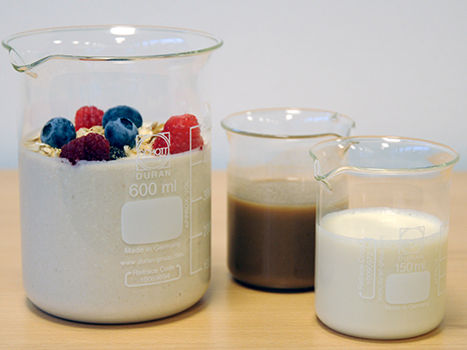Non-recommended milk being provided to young children
More than one-third of infant caregivers reported serving at least one non-recommended milk type to their infant in the past month--most providing them daily—and the majority of toddler caregivers did not follow expert recommendations to provide only cow’s milk to their children, according to a new study in the Journal of Nutrition education and Behavior, published by Elsevier.

Photo by Nikolai Chernichenko on Unsplash
To assess the prevalence of serving non-recommended milk beverages (i.e., toddler milk and plant milk) in place of and in addition to recommended milk-based products (including commercially prepared infant formula and cow’s milk) for infants (aged 6−11 months), infants in transition (12 months), and toddlers (aged 13−36 months), researchers surveyed US primary caregivers of infants, infants in transition, and toddlers.
“We explored the provision of recommended and non-recommended milk products to infants and toddlers, so we looked at infant formulas, toddler milks, cow milks, and non-dairy milks. We also wanted to find any sociodemographic factors that might be associated with the types of milks offered by caregivers of diverse backgrounds,” said Maria J. Romo-Palafox, PhD, RD, Department of Nutrition and Dietetics, Doisy College of Health Sciences, Saint Louis University, St Louis, MO, USA.
Approximately two-thirds of caregivers reported serving the types of milk that experts recommend for their infant or toddler, including breastfeeding and/or serving commercially prepared infant formula with no other milk type to infants and serving cow’s milk to toddlers. However, more than one-third of infant caregivers surveyed reported serving at least one non-recommended milk type to their infant in the past month, including toddler milk and/or cow’s milk, and most reported providing them daily. Furthermore, the majority of toddler caregivers did not follow expert recommendations to provide only cow’s milk to their children and tended to provide non-recommended milk-types—infant formula most often, followed by toddler milk and plant milk—in addition to recommended milk types.
Researchers found that factors such as the child’s age, household income, the racial and ethnic background of the caregiver, and the product’s marketing claims were associated with which milk type the children received, suggesting that more research is needed to understand how diverse populations interpret product claims and how marketing may perpetuate health disparities.
“It’s important to note that infant formulas are not inherently bad. We are glad this product exists for moms who cannot breastfeed. But the public should have all the information so they can make an informed decision about what is best for their baby,” Dr. Romo-Palafox explained. The results of this study indicate an opportunity for public health education campaigns, community outreach, and additional guidance from healthcare providers, especially regarding potential nutrient deficiencies, dehydration, and undernutrition when providing cow’s milk or plant milk to infants and replacing breastmilk (or commercially prepared infant formula).
Original publication
Other news from the department science

Get the food & beverage industry in your inbox
By submitting this form you agree that LUMITOS AG will send you the newsletter(s) selected above by email. Your data will not be passed on to third parties. Your data will be stored and processed in accordance with our data protection regulations. LUMITOS may contact you by email for the purpose of advertising or market and opinion surveys. You can revoke your consent at any time without giving reasons to LUMITOS AG, Ernst-Augustin-Str. 2, 12489 Berlin, Germany or by e-mail at revoke@lumitos.com with effect for the future. In addition, each email contains a link to unsubscribe from the corresponding newsletter.
Most read news
More news from our other portals
Last viewed contents

FrieslandCampina switches to sustainable, paper straws

World’s first 3D printed plant-based beefsteak invented

Determining water quality in the smallest space - Sensor cube for SAC measurement with the Bürkert online analysis system

Vegan ‘yogurt’ made with lactic acid bacteria from plants




























































